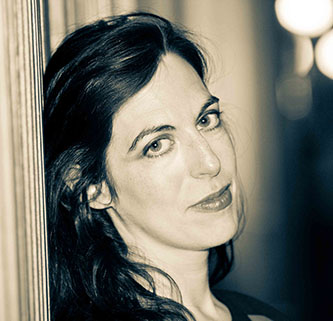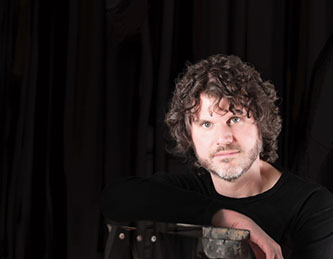Composer Dalit Warshaw's "Sirens" Premiere and Other News From Our Distinguished Faculty
October 3, 2019

Dalit Warshaw
Composition Professor Dalit Warshaw has sent news of her noteworthy summer exploits:
"I am tremendously excited to announce that the Boston Modern Orchestra Project (BMOP) will open its 2019–20 season with the premiere of my new theremin concerto, Sirens, on October 4 in Jordan Hall at New England Conservatory, featuring theremin soloist Carolina Eyck. Also on the program is the first piece ever written for theremin and orchestra, Joseph Schillinger's First Airphonic Suite (1929). Sirens will then receive its New York premiere by the Albany Symphony on November 9. I so look forward to working with both orchestras, and with conductors Gil Rose and David Alan Miller, in the coming months!
"In addition to the October performance, BMOP plans to record these two historic theremin works for release on the orchestra's label, BMOP/sound. This recording of Sirens is of particular importance to me, as the theremin has long occupied a pivotal role in my growth as a composer and performer, chiefly due to the indescribably significant and inspirational role that the legendary theremin virtuoso (and muse of the inventor) Clara Rockmore played in my musical life. Upon Clara's death in 1998, I resolved to realize her vision of the theremin's admittance onto the roster of serious classical instruments, by creating for it a repertoire of art music that would reveal its hidden yet innate expressive potential and highlight the many various potential dramatic and technical facets of the instrument. While I have featured the theremin in works for instrumental ensembles of varying sizes and varieties for years (some of which can be heard on my CD, Invocations), my ultimate goal was to compose a concerto for theremin and orchestra that would feature its timbral versatility and capability to blend within—and solo above—an orchestral music context.
"A note about Sirens and the theremin:
"The theremin has many paradoxical qualities. It is an electronic instrument, yet it can sound profoundly musical, even human. While it is the forerunner for so many subsequent technological inventions ranging from high security alarm systems to the synthesizer, it also remains the electronic instrument most sensitive to human presence, despite the fact that it is played without being touched. Playing the theremin presents its highly unique challenges and marvels, among them dealing with its imaginary, fluctuating aerial fingerboard (for which having absolute pitch is preferable). Also, dynamics and articulations are achieved inversely, as the default state of the instrument—when at rest—is sound, the hand carving away at its negative space much like a sculptor chisels at stone, through interference within the electromagnetic field. To perform the theremin as the inventor intended was to imprint the human musical capacity and technique onto the non-human: it was to lend soul to a machine.
"The fascinating tale of this instrument, its inventor, and the various historical personalities involved in its development begged to be addressed through music. The first movement of Sirens, entitled "Clara's Violin," highlights Clara Rockmore's deep and early relationship with the violin then sublimated into her theremin playing. It also is a musical depiction of Clara's own personal and musical story, the narrative created through an interaction of leitmotifs derived from the names of the characters and the instruments they played. In addition to the leitmotif for Clara, included are the inventor (and her suitor) Lev Termen, her sister Nadia, her violin, her theremin, even the KGB (responsible for the mysterious and sudden disappearance of Termen in 1938).
"The second movement, "Ulysses," addresses Kafka's interpretation of Homer's tale of the Sirens, culminating in a theremin "loop canon." The third movement, "Fugal Horn," presents a romping, scherzando fugue that degenerates into the final type of "siren" presented in this work: an alarm, evoked by the wide glissando effect that is one of the instrument's trademarks (not unlike the orchestral "siren" utilized frequently by composers of the early-mid-20th century, notably Varese). Finally, leitmotifs based upon my own signature both begin and conclude the piece.
"The world premiere of Sirens, alongside the Schillinger, will occur on BMOP's opening concert of the season, "The Roaring Twenties." Also on the program are two works by John Alden Carpenter, and Kurt Weill's Three Penny Music (1929). I'm so tremendously excited to be part of this unusual, lively program!"
More information about the October 4 concert is available on the BMOP website.
Warshaw later added:
"Some exciting news, as preparations are continuing for the upcoming premiere and recording of my theremin concerto, Sirens: The performance has been listed among Zachary Woolf's "10 Months of Classical Concerts You Won't Want to Miss" in The New York Times!
"I would also love to share with you an online interview featured by the Boston Modern Orchestra Project (BMOP), in which I address the background of Sirens, the idiosyncrasies of composing for theremin, my teaching, and working with the astounding thereminist Carolina Eyck."
Jason Eckardt

Jason Eckardt
Composer Jason Eckardt's work continues to garner attention and accolades. The New York Times recently published two articles that focused on his music. The first was a preview of a recent concert that included Eckardt's composition Dithyramb, including a video link to the work:
https://www.nytimes.com/2019/11/21/arts/music/lucy-dhegrae-national-sawdust.html
The second was a review of Conrad Tao's Carnegie Hall debut, which included another one of Eckardt's compositions, Echoes' White Veil. The article exclaimed, "Mr. Tao tore into Jason Eckardt’s 'Echoes’ White Veil,' a ferocious 11-minute work, all frenzied eruptions of hellbent runs and leaping chords.":
https://www.nytimes.com/2019/11/21/arts/music/conrad-tao-carnegie-review.html
Lars Frandsen

Lars Frandsen
Guitar Professor Lars Frandsen performed a lecture-recital for the IGRC Conference in Hong Kong in July. The conference ran from July 14 to 20 at the Hong Kong Academy for Performing Arts, simultaneous to the 4th Altamira Hong Kong International Guitar Symposium and the HKAPA International Guitar Forum.






